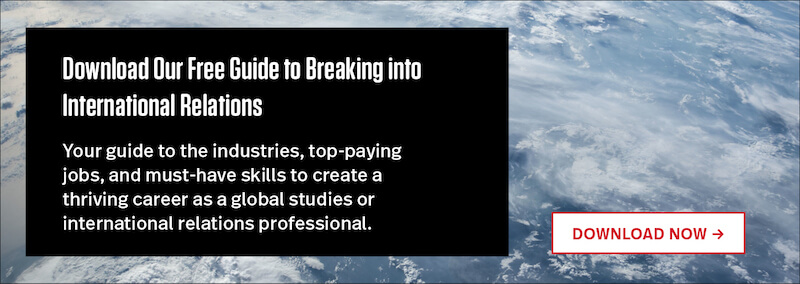The 21st century has paved the way for greater connection, communication, and trade on a global scale. With a greater connection worldwide, the need for effective, progressive diplomatic relations between countries is of the utmost importance. Specifically, effective ambassadors are needed to promote international relations, trade, and foreign policy.
Ambassadors act as the diplomatic representatives of their country abroad. In the United States, ambassadors are appointed to represent the office of the President in foreign nations. The title comes with a number of duties and responsibilities, including conducting foreign relations, crafting international policies, spearheading negotiations, and aligning on economic conditions such as trade.
With such a wide range of skills required to become an ambassador, it can be challenging to understand how to stand out. Referencing the combined experience and expertise of three former ambassadors now serving as members of Northeastern’s faculty, we’ve compiled some steps, tips, and industry insights to help any aspiring ambassador achieve success on a global scale.
Download Our Free Guide to Breaking into Global Studies and International Relations
A guide for what you need to know to prepare for, and work in, today’s globalized world.
How to Become an Ambassador: 5 Steps to Success
1. Earn a relevant bachelor’s degree.
Although the U.S. State Department does not list specific educational requirements for aspiring ambassadors, earning a bachelor’s degree can go a long way in landing a role in this field. In fact, education at this level has become a requirement across industries today, and can increase your chances of making it into further rounds of consideration during job applications.
Aspiring ambassadors are not limited to a specific degree at the undergraduate level either. Simply put, any degree that provides the skills and knowledge needed to excel as an ambassador can be a good fit. For instance, degrees that help students develop their public speaking, research, problem-solving, and critical thinking skills—such as political science, international relations, history, and foreign language degrees—can all be a great choice for those interested in a diplomatic position.
2. Earn a graduate degree.
Unsurprisingly, the State Department lists an ambassador as a “senior-level” position, meaning that a high level of experience and education is generally required to achieve this career. Often ambassadors and other diplomats have very specific expertise in a diplomacy-related field, which is why many individuals who seek to become an ambassador have advanced their education beyond the undergraduate level with a graduate degree that has an international focus.
Former U.S. Ambassador to the Republic of Cameroon Janet Garvey worked in the Foreign Service for 33-years and now serves as a member of Northeastern’s faculty. She describes the importance of specialized knowledge for aspiring ambassadors:
“Studying international relations and learning about global issues is an excellent way to prepare for a diplomatic career,” says Ambassador Garvey. “Although diplomats often have different backgrounds, an interest in the world and a base of knowledge about international relations is extremely useful. Diplomats are always learning, whether it is a new language or a new culture. Having studied those topics at the graduate level is not just good preparation, it demonstrates the capacity to continue to learn.”
Exactly which graduate degree will make the most sense for you, will depend on your unique aspirations. A master’s degree or PhD in public administration, public policy, political science, or international relations can all be effective in helping you develop the expertise that will be required of you.
Northeastern’s Master’s in Global Studies and International Relations, for example, is specifically designed to help students prepare for an advanced diplomatic role. By completing the program, students gain specialized knowledge that will enable them to frame and evaluate global challenges by drawing on perspectives and methods from diverse fields of study. What’s more, four concentrations—including Global Health and Development; Conflict Resolution; Diplomacy; and International Economics and Consulting—allow students to hone in on the topic that they are most interested in building a career around.
3. Gain work experience.
As with any career, gaining relevant, hands-on work experience is a crucial step in becoming an ambassador. For that reason, it is important that you take as many opportunities as you can during your time in the educational- and professional-level to perfect your foreign language skills and develop true expertise about your country or area of focus.
Those who chose to complete a relevant graduate degree at a top university like Northeastern will have the opportunity to get a jump start on this real-world experience while they’re still in school. For instance, Northeastern’s experiential learning model, allows students to put ideas into action through work, research, international study, and service. With opportunities available in 93 countries around the world, students can gain first-hand industry experience in a learning environment that fully integrates the classroom and the real-world.
This learning model is made possible by Northeastern’s extensive global network of experiential learning partners, industry leaders, and alumni. Northeastern’s flagship campus is located in Boston, but regional locations include the Massachusetts communities of Burlington and Nahant; Charlotte, North Carolina; London; Portland, Maine; San Francisco; Seattle; Silicon Valley; Toronto; and Vancouver. Northeastern’s global partners consist of more than 3,350 businesses and nonprofits spanning across 150 countries on six continents.
With such a large network, Northeastern students are given unparalleled access to alumni, professionals, and faculty across a diverse array of industries. These resources are especially helpful for students conducting special projects, case studies, or global research.
Baktybek Beshimov, PhD—a former Kyrgyzstan Ambassador to India, Sri Lanka, Nepal, and Bangladesh and current professor for Northeastern’s Global Studies and International Relations program—describes the role a degree centered on experiential learning plays in preparing a student for an ambassador career:
“CPS’s global studies and international relations program helps students to set up the foundation of their successful careers in diplomacy,” says Beshimov. “They can improve and obtain much-needed skills, which are paramount for those who want to become an ambassador.”
Additionally, there are a number of internships offered by the U.S. Department of State for individuals interested in following a diplomatic career, including:
- The Pathways Internship Program: This program includes a number of options for students of all ages—from high school to graduate school. The internship is paid and offers students a chance to explore domestic Federal careers.
- U.S. Department of State Student Internship Program: This program, similar to the Pathways Program, offers students a chance to understand global issues. Students often work with U.S. embassies and consulates throughout the world. This allows for students to work directly with foreign policymakers while participating in meetings with foreign government officials and senior U.S. Government workers.
Graduate students may also have access to additional opportunities through their college or university. At Northeastern, for example, interested students can participate in the university’s International Relations Council, which hosts Model United Nations, Arab League, and NATO organizations. The IRC also allows students to work collaboratively to develop the skills necessary to succeed on the global stage, such as public speaking, research, negotiation, delegation, and foreign language skills.
Northeastern students can also opt into the International Field Study Experience (IFSE), an experiential learning program that gives students the opportunity to serve as international consultants for global organizations. Students who participate in this program will also have the opportunity to:
- Experience diverse organizational and national cultures
- Engage with industry leaders
- Experience deep cultural immersion
- Hone research skills in a professional setting
- Practice interdisciplinary and virtual teamwork
- Explore the global problem of sustainability from an interdisciplinary perspective.
4. Take the Foreign Service Officer exam.
Foreign Service Officers (FSO) are an essential component of the U.S. Government, helping to develop, create, and implement foreign policy. Working as an FSO is also a perfect opportunity to gain diplomatic experience and begin working up the ranks towards an ambassadorship.
As with most U.S. government jobs, there are certain stipulations and requirements to be considered for employment. For example, Foreign Service Officers must:
- Be a U.S. citizen when submitting your registration
- Be between 21 and 59 years old when submitting registration
- Be between 21 and 59 years old on the day you are appointed for duty as an FSO
- Be available for assignments worldwide
The U.S. Department of State provides several details about foreign service officers online. Potential career paths include working as consular officers, political officers, economic officers, public diplomacy officers, and management officers.
The Foreign Service Officer Test, or FSOT, is a large component of the selection process for an FSO, and regardless of your assignment, you will be required to pass the exam. The exam covers relevant topics FSOs are likely to experience on a daily basis in their role, and tests candidates on their situational judgment abilities. English proficiency is also graded, as candidates must write an essay to complete the exam.
The U.S. Department of State has provided several resources for proper test preparation, which can help candidates adequately prepare.
5. Receive appointment.
Once you’ve passed the FOST and completed the process of becoming a Foreign Service Officer, you should continue to develop your skills and work to gain as much experience in your desired field as possible. An ambassador is the highest-ranking diplomat serving in a foreign country, which is why a deep and expert level of understanding about the region’s history, geography, politics, and language is critical to diplomatic success.
Ambassador Friedrich Lohr is a faculty member in Northeastern’s Global Studies and International Relations program with prior diplomatic experience serving as a career officer in the German diplomatic service as Ambassador to North Korea. Lohr stresses the need for aspiring ambassadors to network while developing a diverse set of diplomatic skills:
“Endeavor to be almost a jack of all trades,” Lohr says. “Diplomats have to learn to be level-headed, dynamic yet modest, curious yet disciplined, circumspect yet reliable, proactive yet unobtrusive, knowledgeable in many fields, but no wisecracks. Most importantly, find yourself a good mentor—or mentors for different fields of experience—beyond learning the ropes of the trade as a junior diplomat.”
Take the Next Step
As the highest-ranking representative of the United States in a foreign country, ambassadors must be equipped to handle unique situations and scenarios that can have a global impact. Pursuing a graduate education specifically designed for those interested in diplomatic work is an excellent way to develop the skills and expertise that will be required in such a position, and can help you begin to gain the valuable experience you need to land a role in this exciting field.
Are you considering a career as an ambassador or diplomat? Learn more about how earning an MS in Global Studies and International Relations at Northeastern University can help kickstart your career, or download our guide to advancing your international relations career below.







Related Articles
How You Can Use Geographic Information Technology
5 Reasons to Study International Relations and Diplomacy
Master’s Lands Alum Role with the Dept. of Homeland Security